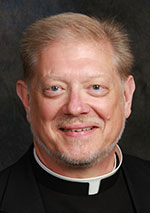That All May Be One / Fr. Rick Ginther
Spirit’s work is evident at gathering on Christian unity
 The beautiful city of Louisville, Ky., was the site for the National Workshop on Christian Unity (NWCU) on April 18-21. “Christian unity is closer now that you are here” was the theme.
The beautiful city of Louisville, Ky., was the site for the National Workshop on Christian Unity (NWCU) on April 18-21. “Christian unity is closer now that you are here” was the theme.
The Catholic Association of Ecumenical and Interreligious Officers board (CADEIO) began the first day with a two-and-a-half hour meeting, then moved to the Cathedral of the Assumption for a noon liturgy. Archbishop Joseph E. Kurtz of Louisville, who also serves as president of the U.S. Conference of Catholic Bishops (USCCB), presided at the Mass. We were greeted warmly—it was an excellent way to begin our work.
The week unfolded from there with workshops, seminars and networking. The annual update from the USCCB on the progress of international and national ecumenical dialogues revealed much progress and few setbacks.
The theme of the week played out for me through daily Bible study sessions and a personal encounter.
Bible study was led by Rev. James Alexander Forbes, Jr. Among many positions and honors, Rev. Forbes is senior minister emeritus of the Riverside Church in New York City. His résumé in our program covered an entire column!
Our study focused upon “the continuing community building power of the Spirit.” It was broken up into three sessions.
The first session focused on “Spiritual Empowerment for an Urgent Assignment.” 1 Kings 19 was the central passage. We learned that “when God is feeling something, and God wants to do something about it, he recalls a name.” Hush! Someone is calling your name.
The second session focused on “Confronting the Giants and the Raising of the Community’s Spirit.” 1 Samuel 17 and Ezekiel 37:1-23 were the central passages. We learned that there are giants yet today: racism, materialism, militarism and terrorism. The ecumenical community, in a united voice, is called to confront these evils.
The third session focused on “Unity in the Spirit and the Perfecting of the Saints.” Luke 4 was the central passage. We were encouraged to “find the place that identifies why you came to this Earth, and how your daily life and the grand plan of the Creator are one.”
Rev. Forbes was riveting in a style unfamiliar but inviting and powerful.
Other evangelical Christians made our time richer by their presence and their passion for the Gospel and unity. One group, the Consortium of Evangelical Networks for Unity (CEN), is a small but growing presence at NWCU. They want to be a part of the work we are about. Connections with these brothers and sisters are growing.
My personal encounter began outside the hotel. I began to walk the five blocks to the cathedral for the opening social and prayer with Wes, an 80-something gentleman whose pace was steady but slow. Ambling along, introductions led to snatches of our lives and ecumenism. His story was revealing.
A retired Lutheran theology professor, Wes was invited to become involved in ecumenical circles by his brother-in-law, also a retired professor. They have a passion for listening, learning, praying and hoping. They are Missouri Synod Lutherans—a rarity at NWCU. The two have a gift and passion for the work, though it is a work not embraced by their own synod. I was awed by Wes’ courage and determination to be a man of unity.
Yes, “Christian unity is closer now that you are here.” Thank you, Rev. Forbes! Thank you, Wes!
(Father Rick Ginther is director of the archdiocesan Office of Ecumenism. He is also dean of the Terre Haute deanery and pastor of St. Patrick and St. Margaret Mary parishes, both in Terre Haute.) †
 The beautiful city of Louisville, Ky., was the site for the National Workshop on Christian Unity (NWCU) on April 18-21. “Christian unity is closer now that you are here” was the theme.
The beautiful city of Louisville, Ky., was the site for the National Workshop on Christian Unity (NWCU) on April 18-21. “Christian unity is closer now that you are here” was the theme.